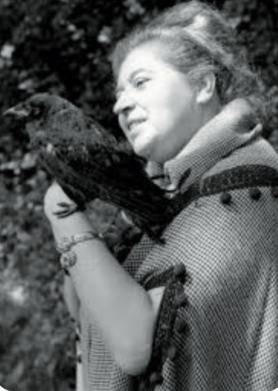
Sybil Leek
Sybil LEEK a biography by C.Ravin Esq. WWII.
I became a nurse in the famous military hospital in Netley, near Southampton. Originally, when Great Britain had an empire in India, an architect was asked to design two large military hospitals, one for India and one for Great Britain. Apparently the architect's plans got crossed; Netley found itself with a huge military hospital that was suitable for a torrid climate and had a definite Indian motif about it. I ended up in the Netley hospital's Prisoner of War Department because I spoke French well and knew a smattering of German. It was a nerve-racking experience, dealing with prisoners of war who were sick, many of whom had lost a limb. The Germans were aggressive and rude to all the female staff. They were not truly interested in living, and many fought against medical attention. It was a great lesson in discipline to nurse the enemy and know he was still the enemy. We were told that we must not, under any circumstances, allow a prisoner to provoke us. In theory, it was fine; in practice, very hard. We were all high spirited girls from good families, and every one of us had men from the family in the service. We had to withstand barrages of abuse, physical onslaught, and sexual advances, and we still had to try to be pleasant.
One day I heard that my cousin Edwin's plane had been shot down in Germany. The telegram said he was "missing and presumed lost in battle combat." I entered the ward, which was at the top of the building, and was hit full in the chest by a large bouquet of flowers still in its bowl - it was a painful experience. I became glazing mad; I stalked over to the patient, and slapped his face on both sides. Many years later, when I saw the film Patton, I knew exactly the type of demon that got into the General when he slapped an American soldier. Of course, I was reprimanded and confined to barracks for a week. The soldier was moved to another hospital, which showed tact on the part of the Commanding Officer. All the girls felt that the slap was administered on behalf of all of us, for we had had a particularly nerve-wracking week. I was working on night duty at the time, but we had so many casualties that there was no distinct changeover for any of us.
We stayed until an entire hospital ship checked into the hospital; the operating theatres were working like mad. I used to leave the theatre dazed, physically and mentally sick, wondering when it would all end. On duty in the wards, when we were alerted that a wave of bombers was coming over, we always had to check the blackouts. Not a single window could be undraped. Many of the prisoners of war who could walk would cheer when there was a raid and would sing German songs as they tried to tear down the blackout coverings. We had to fight them off and sometimes threaten them. The German soldier was inclined to despise the female in uniform, but I learned I could scream as loud as he could, and I picked up enough swear words to start a new dictionary.
The sixtieth section of the London Red Cross may have started out in Netley as a group of young society ladies, but after a few months of campaigning like this, we had forgotten what the word "lady" meant. We were hardened Boadiceas, ready to be in the thick of battle 24 hours a day. We all came form families that frowned on girls drinking and smoking, but we learned both from the male members of the 101st Bridging Company of the Royal Engineers. We all had officers' privileges, which included using officers' mess rooms when we had time. We ate fairly well, but the elegant sixtieth section was given sleeping quarters in barracks that had once been condemned as unfit for use by British soldiers. We thrived on hard conditions, hard palliasses, rough army blankets, and no sheets, because they were needed in the hospital, where supplies of everything dwindled as the war progressed.

